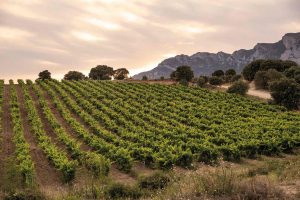A global icon, synonym of Gran Reserva Rioja
Faustino I accounts for 30% of all Rioja Gran Reserva DOCa bottles sold worldwide. It can be enjoyed in more than 140 countries with over 76 million bottles sold in the past 50 years. The brand is a synonym of Gran Reserva Rioja, having consolidated the style and the region as household names.
The first release of Faustino I happened in 1964; bottles from the 1958 vintage, classed as Excellent in Rioja. The wine’s name is a tribute from Don Julio Faustino, the 3rd generation at the helm of the estate, to his father, Don Faustino. With the creation of this Gran Reserva, with its distinct label and bottle, Don Julio pioneered an approach to branding and packaging that influenced many other producers, in Rioja and beyond.
The portrait of Rembrandt that features on the wine label until today has become iconic in itself, a familiar and reassuring presence in wine shelves the world over.
These bottles contain an equally recognisable wine, known for its consistency and longevity. The grapes used for Faustino I hail from prized plots in Oyón and Laguardia, from which a careful selection of the best Tempranillo, Graciano and Mazuelo is sourced for a classical Rioja blend. Faustino I is only produced in vintages considered to yield the quality required to meet the strict standards defined by the winemaking team.

History rooted in the future
Bodegas Faustino remains a family-run winery, now with the 4th generation of the Martínez Zabala at the helm of the estate and ensuring its continuity. The 160 years-old legacy is in the good hands of a family inspired by deep-rooted vines and historic traditions, while determined to bring the Faustino brand and wines to new drinkers all over the world. Entrepreneurship and innovation remain at the core of their ethos.
Bodegas Faustino has conducted a comprehensive study on oxygenation in wine, and on how to minimise and control the amount of oxygen dissolved in the juice during the different stages of the winemaking process. By adding nitrogen at low pressure the amount of oxygen in the wine is reduced therefore retaining more freshness of fruit and benefiting more subtly from the time ageing in barrel. Lower oxygen in the wine also means there is less need to add sulphur for preservation and stabilisation, therefore supporting a more natural approach.
A new look, the same character
The 2010 vintage of Faustino I unveiled a new image, designed to reiterate the tribute to Don Julio. The glass is coated with a layer of resin which prevents light damage and makes the vessel significantly more resistant. A different paper stock, more textural and with gold reliefs, allows the sensorial experience to start even before the first glass is poured.

Inside is the wine of another harvest with all the hallmarks of a historic Rioja vintage. “The 2010 vintage was a gift from heaven. It was a perfect vintage in Rioja, but we were particularly blessed by the better microclimate in Oyón and Rioja Alavesa “ says Juan José Díez, winemaker at Bodegas Faustino. 2010 mirrors the greatest Rioja vintage of the 20th century, 1964, with a dry, long growing season, moderate yields and healthy grapes balancing medium acidity, concentration and measured alcohol potential.
The future is written in green
Grupo Faustino has affirmed its commitment to sustainability with an environmental manifesto that defines best-practices across the different facets of the business.
Every process is controlled and registered, allowing for all actions to be identified, organised, and planned with minimum impact on three main variables: energy, water and waste.
From structural changes in the wineries to improve the thermal efficiency of the buildings, to the incorporation of pressure systems in cleaning circuits for water saving, by way of rationalising of SO2 use in all processes, Faustino is implementing active changes that will dramatically improve the environmental performance and reduce the carbon footprint of the business as a whole. A fundamental part of this work is already being done in the vineyards and cellars; energy saving in luminaires and machinery, thermal isolation efficiency, the use of recycled glass bottles, carton and recyclable closures are many of the ways in which consumers will get to experience this philosophy when drinking a wine produced by Bodegas Faustino.
With the festive season upon us, a bottle of Faustino I is a shared commitment to responsible, traceable winemaking and a memorable tasting experience.
Discover more about
Faustino I Gran Reserva here
Connect on Twitter | Facebook | Instagram








